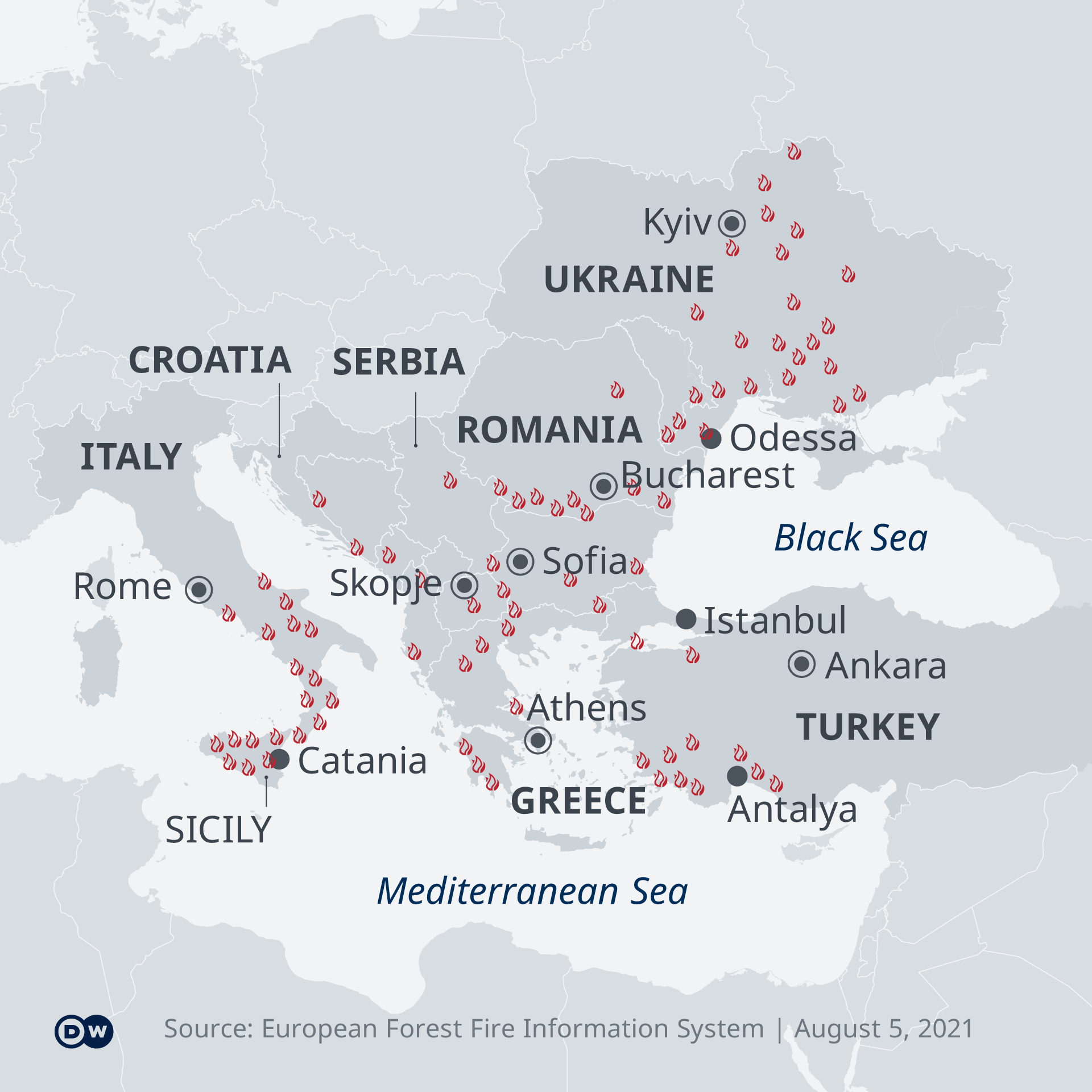People are fleeing their homes north of Athens as fires rage for a fourth day in a row. California has lost an entire town, while Brazil is bracing itself for another catastrophic fire season.

Greek officials said the extreme heat has turned the country into a 'powder keg'
Thousands of residents fled a wildfire north of Athens early Friday as Greece's government warned of tough days ahead.
Firefighters continued their efforts to prevent the flames from reaching populated areas, electricity installations and historic sites, as the region faces its fourth day of inferno
In heat wave conditions, fires tore through forest areas 20 kilometers (12.5 miles) north of the capital, destroying dozens of homes. Fires are also causing destruction in the Peloponnese, a peninsula located at the southern tip of the mainland; and in Euboea, Greece's second-largest island. These two regions, along with Athens, are suffering blazes of "enormous strength and scale," Greek Prime Minister Kyriakos Mitsotakis said.
Nearly 60 villages and settlements were evacuated Thursday and early Friday across southern Greece, with temperatures set to increase in the coming days.
Mitsotakis warned of strong westerly winds on Friday, meaning the affected regions are going through an "unprecedented" situation "because the past few days of heat and drought have turned the country into a powder keg."
People are not allowed to visit forests until at least Monday, while any work involving sparks or flames is banned.
Fire crews, planes and helicopters from five European countries are set to arrive on Friday and across the weekend as the EU steps up efforts to halt the fires.
'All is tinder-dry, and it just takes the tiniest spark': Barbara Wesel reports from Athens
Here are the latest developments across the globe as several countries battle wildfires and increasing temperatures.
Turkey
Turkey entered its 10th consecutive day of fires, with 12 blazes still out of control, the Presidential Communications Office said on Friday.
The country is suffering from its most severe fires in well over a decade, with the worst-affected areas along Turkey's southern and western coastline, and in the regions of Antalya, Marmaris, Bodrum and Milas.
Flames engulfed several neighborhoods during the night in Milas, but with residents already evacuated, the fire was eventually brought under control by emergency crews.
At least eight people have died in Turkey since the fires broke out last Wednesday, and more than 100,000 hectares of forest and fields have fallen victim to the flames
Evacuations in southwest Turkey as wildfires reach power plant – DW's Julia Hahn reports
North Macedonia
Wildfires in North Macedonia have prompted the government to declare a 30-day state of crisis.
Over the course of the month-long emergency, the fire brigade, the military and security forces will fight the blazes.
Eight forest fires are still burning with the largest being near the village of Pehcevo in the center of North Macedonia.
NORTH MACEDONIA REELS FROM RAGING WILDFIRES DURING HEAT WAVE
State of emergency
North Macedonia has declared a state of emergency for 30 days in response to the wildfires that have been raging through the country for the last four days. That means the government in Skopje can centralize all resources and forces and take complete command of the situation from local communities. The scorching heat and strong winds have already resulted in huge damage. 123456
Albania
Albania's defense ministry has described its fires situation as "critical" because of the increasing threat to villages and residents' homes.
United States
A fire that has been raging for three weeks engulfed Greenville, California, on Wednesday and Thursday, prompting regional Republican representative Doug LaMalfa to say the town had been "lost" to the blazes.
The inferno left a trail of destruction, meaning most of Greenville's historic downtown and homes were reduced to ash as crews braced themselves for more severe weather in the coming days.

A Greenville gas station was among dozens of buildings destroyed by the Dixie Fire
The Dixie Fire, aided by winds of 40 miles per hour (64 kilometers per hour), "burnt down our entire downtown," Plumas County Supervisor Kevin Goss wrote on Facebook.
Greenville dates back to California's gold rush era with some wooden constructions well over 100 years old.
United Kingdom
The UK announced a £5 million ($7 million, €5.9 million) research program on Friday to help better prepare for the risks posed by climate change.
With nearby nations such as Germany and Belgium witnessing devastating floods recently, and large areas in southern Europe currently ablaze, the UK is taking urgent action.
"From flooding to wildfires – the extreme weather events we've recently witnessed show how crucial it is for communities to build resilience and protect their futures," Alok Sharma, president for the COP26 international climate talks to be held in Britain later this year, said in a statement.
The UK's independent climate advisers in the climate change committee have warned that Britain has so far failed to prepare for the upcoming changes. A warmer planet is likely to bring many challenges, including worsening food security and more health risks due to overheating buildings.
Severe drought and early data suggests forest fires in Brazil this year will match those of 2019 and 2020 in terms of devastation caused.
With the Latin American country's forest fire season underway, the government space agency said last month more area was burned than in any July since 2016. Results for June were exactly the same, with that month's data also the worst in the last five years.
Most wildfires in Brazil are started intentionally, often illegally by land-grabbers clearing forest for cattle or crops. The fires tend to increase in intensity in June before peaking in September, according to historical data. They can easily get out of control during the dry season, burning large swaths of forest to the ground.
Brazil experienced catastrophic fires in the last two years, which caused the greatest annual forest loss since 2015. Widespread criticism from the international community ensued over the response to the crisis by the administration of President Jair Bolsonaro, who has repeatedly called for development of the region while ignoring the pleas of the indigenous population.
jsi/dj (AP, AFP, dpa, Reuters)
IN PICTURES: DEADLY EXTREME WEATHER SHOCKS THE WORLD
Fierce flash floods in Europe
Unprecedented flooding — caused by two months' worth of rainfall in two days — has resulted in devastating damage in western Europe, leaving at least 209 people dead in Germany and Belgium. Narrow valley streams swelled into raging floods in the space of hours, wiping out centuries-old communities. Rebuilding the ruined homes, businesses and infrastructure is expected to cost billions of euros. 34567891011
DW RECOMMENDS
German Green party presents plan for flood prevention
The Greens have long warned of the extreme weather effects of climate change. Now, they're proposing a program to prevent a recurrence of July's flood disaster.
Climate change, migration: How Merkel’s potential successors measure up
Merkel is leaving office after 16 years. One of three candidates could succeed her. DW analyzed: What do they talk about in parliament? How do they vote? And what does that mean for their potential chancellorship?
Carbon emissions: China, India miss UN deadline to update targets
China and India, among the world's worst offenders for emissions, have failed to submit updated target proposals to curb the release of carbon dioxide.


























